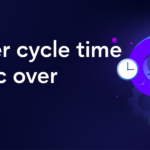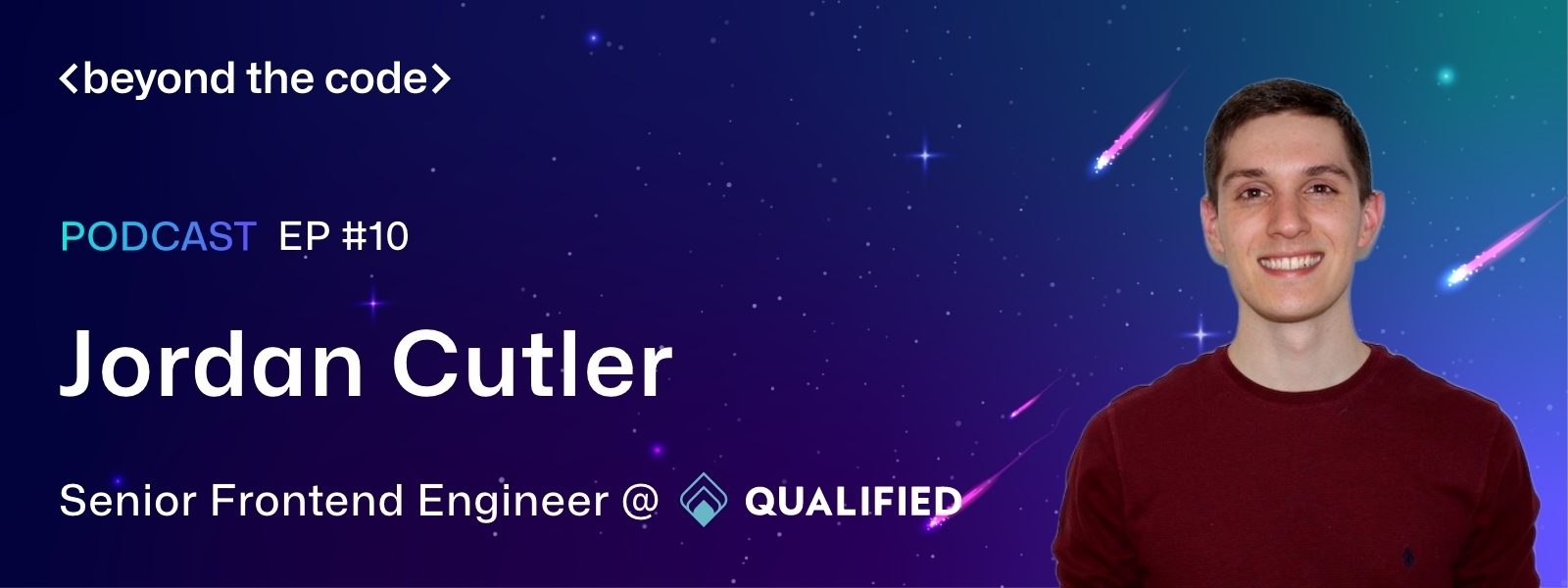In the recent episode of ‘Beyond the Code’, Host Kshitij Mohan, founder of Typo, engages in a thought-provoking discussion with Jordan Cutler, Senior frontend engineer at Qualified. He has also contributed his expertise to reputed companies such as Twitter, Dolomite, and Gusto. The heart of their conversation revolves around Metrics, strategies, and burnout prevention for tech teams.
The episode kicks off with Jordan recounting his inspiring journey, followed by a fun fireside chat. Following that, he imparts valuable wisdom on achieving a balance between team dynamics and leadership roles as a senior engineer. He delves into the effective utilization of metrics and new tech tools along with addressing the critical issue of developer burnout.
Wrapping up, Jordan leaves the viewers with valuable advice on continuous learning and nurturing personal growth.
Time stamps
- (0:06): Jordan’s background
- (4:32): Fireside chat
- (7:06): Balancing team dynamics and leadership roles as a senior engineer
- (9:09): Metrics to dive deeper into issues and track progress
- (11:12): Managing introduction of new tech tool in the team
- (14:14): Introduction of AI tech tools
- (15:33): Briefing about Copilot
- (16:54): Balancing between auto mode tools and learning important aspect of engineering industry
- (18:02): Addressing developer burnout
- (22:23): Jordan’s advice for viewers
Links and mentions
Episode Transcript
Kshitij Mohan: Hello everyone. I’m Mohan your host back with another exciting episode of Beyond the Code by Typo. Today’s guest is a young gun of the engineering ecosystem. Within a short span of eight plus years, he has evolved from being a software developer to an engineering coach, to an author of a newsletter. He has worked with teams at Twitter, dolomite, Gusto, and so on.
Please welcome Jordan to the show. Hey, Jordan.
Jordan Cutler: Hey, how’s it going? Super happy to be here.
Kshitij Mohan: Thank you so much for sharing your time with us. Means a lot.
Jordan Cutler: Yeah, thanks. I’m super excited to chat more and get this going.
Kshitij Mohan: Definitely Jordan. I think before we start with anything, right? First, we would love to understand your amazing journey, right? And the kind of mission that you are on today to help fellow engineers achieve their career goals faster. I think this is really interesting. So to begin with, please share some light on the journey that you have been on, Jordan.
Jordan Cutler: Yeah, totally. So I started off interning at Twitter. At the same time, I was actually working at Dolomite, which is like a crypto startup by a couple alumni at the same university that I went to. So I was kind of working two jobs. That’s kind of what helped me like catapult a little bit, to be honest. But I wouldn’t recommend anyone to do it. It definitely like got me to the point of burnout. But it definitely also helped me get a really good start to my career. Know a lot. I got kind of the mixed bag of experiences between working at a well-established company Twitter.
And then having no code at all and going from no code to 80,000 lines of code and mentoring the other engineers on the team. And when I started at Gusto, it was a really awesome experience because it was kind of in the middle ground. So I kind of have like this very wide, you know, range of like small, middle, large, and Gusto was super awesome too. It was like a startup within a startup was the team that I was on. It was like a financial products team that essentially helped people, get access to their paycheck before their normal payday, their biweekly payday so they could get their paycheck a week in advance.
And it helps people in like, you have a car breakdown, get in a hospital situation and a lot of people live paycheck to paycheck. So, it was like an entirely new product we were working on. So it was almost like a startup with the security of a bigger company behind you.
Kshitij Mohan: Yeah
Jordan Cutler: So it was really awesome, man. And I loved the experience there. That’s how I ended up getting to the senior level pretty quickly. I got back-to-back promotions up to senior and then now I’m working at Qualified and I’m here doing mostly like front end development, infrastructure, platform platform-related work. And it’s just been awesome. So that’s kind of the journey.
Kshitij Mohan: Awesome. And how did you land on to this thought of running your own newsletter, supporting other folks in the career journey? This is a really interesting part that we’d love to know about.
Jordan Cutler: Yeah, a hundred percent man. I think what happened was at Gusto, I did this thing where I gave a lot of the advice that I give on LinkedIn, but in Slack, and it kind of blew up into like this channel that was just kind of typing notes out to myself, like writing my learnings and it got to the point where I think there was like 60 people in the channel and I wasn’t really like advertising it that much or anything. And I was like, oh my gosh, people actually really enjoy some of this stuff. And so I think eventually I thought, wait, what if I like put this out there into the world? And I just started with like one LinkedIn post. It did pretty well, and I was like, wait, let me just keep this going. And so kept on going and then eventually turned it into a newsletter. And now, yeah, we’re up to 7,500 subscribers. I think like 25 paid subscribers, which is more than I could ever imagine having got, it’s so awesome. I’m so thankful. And, the LinkedIn growth has been really awesome too.
Kshitij Mohan: Yeah. It looks like your content is read, shared. I think you must be doing something amazing that the community is loving you, Jordan.
Jordan Cutler: Yeah, I appreciate it, man.
Kshitij Mohan: Perfect. So, I think before we get started with anything, I think we would all love to have some quick fun fireside questions with you to know Jordan as a person more. So if you’re ready, let’s get started.
Jordan Cutler: Let’s do it, man.
Kshitij Mohan: Perfect. So question one, Jordan, if you were not a coder, which alternative career path you think you would’ve chosen?
Jordan Cutler: Yeah, this is a good question. I think like a while ago I, it probably would’ve been like accountant or you know, finance or something like that. But I know that’s like a classic answer for engineers to think if I were to go like the more creative, like fun route though, it would probably be like photographer.
I’m definitely like, I love photography. I love getting into taking pictures and taking cool stuff.
Kshitij Mohan: Great. So is it like more of a, a nature photography or some abstract?
Jordan Cutler: I think like just in general. I like taking pictures of animals for sure especially cats. I got like a couple closeups of my outdoor cat the other day, so that was really, really nice.
Kshitij Mohan: Perfect. Question two for you, Jordan. What’s the favorite tech gadget that you use daily?
Jordan Cutler: Okay, so I think for this one I’m gonna give you like, the most unique answer you’re probably ever gonna hear is my blinds. You know the window blinds. I got these automatic blinds where it’s like the smart blinds and they go up and down at sunrise every single day automatically. And I think it’s like the best thing ever. It’s like just totally automated. You don’t need to worry about it. The light is kind of the same every single day.
Kshitij Mohan: Definitely, this is one of the craziest answers, Jordan, that we’ve ever heard. So kudos to you for doing this. Perfect. So last question, right, so about this high growth engineering newsletter that you write, So what’s that one piece of advice that you think every engineer should know in their career progression?
Jordan Cutler: Yeah, definitely. I would say there’s a lot of focus on code. But as you get higher and grow to the more senior levels, you’re gonna see that focusing on code can only get you so far. And it’s really like the relationships and building that strong bond between your teammates and your manager, that is gonna get you further and further. And it’s good to focus on that.
Kshitij Mohan: This totally makes sense. I think it’s always the people skills that take you longer than any other aspect of your work. Perfect. Perfect Jordan. This was cool. So, now getting to the real stuff, right? So just to give you a quick context. So we have been having these, interesting, insightful conversations with a lot of engineer leaders, senior engineers of the ecosystem, but we thought, Hey, how would a perspective of a senior engineer would look like, right? How do they fit in because they are always stacked between the senior leadership and the team that they’re supporting with, and that’s how they’re kind of building the entire ecosystem. So we believe this is the toughest phase of any journey, right? Where you have to balance work, relationships, teams. And I think this is what we would love to more talk about with you today. And I think to begin with, the first aspect comes in how do you build this balance, right? You manage teams as well as you manage the expectations of your leaders as well. So, would love to start with these thoughts, Jordan.
Jordan Cutler: Yeah, definitely. I’m trying to think. One thing that typically comes to mind that a lot of ICs want to get done compared to management is like cleaning up tech debt, right? Management is typically like, Hey, we need this new feature. We need this quickly and all that. And I think a lot of times it can be up to the more senior ICs or tech leads to try to help bridge that communication to help management understand better. You know like, hey, we need to focus on the stability aspect here and one good way to do that is to literally show examples of where the stability has failed and say, like this last feature rollout, it went bad because we didn’t have our stuff together in this area of the code and we had to take shortcuts or, we didn’t do proper testing all that and help them understand a little bit better that like some of these things are gonna take a little bit more time.
Kshitij Mohan: This totally makes sense. I think a very good thought, Jordan, that there is always discussions around tech debt. You would want to, but again, you are pulled back, no, hey, this is what you wanna focus on. And I think talking about this itself, so as you mentioned, right? You would want to show some things to the engineering leadership to believe, Hey, this is where we are at today, right? For example, a feature failure that you mentioned, right? So, in your experience, have you seen using any metrics or any sort of visualization that kind of helps everyone understand- hey, this is where we are at, this is what we need to focus on, any other things that you have used maybe in your experiences so far?
Jordan Cutler: Yeah, yeah, definitely. A couple things that come to mind are one thing we’ve done is track issues in bug snag. So, it’s like a kind of like your standard error reporting tool where you could see how many errors are occurring. And you could point specifically to that. There was one point where I think we were able to show that there was like 5,000 user errors occurring like every month. And you know, show exactly like, hey, these are all the different areas. It’s normally like, you know, because. This stuff is not in TypeScript or we don’t have our proper error-handling patterns in this area. And from that you could say, Hey, we need to focus on this a little bit more. The other thing I like doing too is you could track specific metrics at CI time. So one thing like we’ve done before is track how much of a percentage of the code is in like the new system versus the old system and we could say like, Hey, you could see like this part of the code here is just not entirely this. And for some reason when you put it on a dashboard versus just saying it, it makes it that much more like impactful.
Kshitij Mohan: Exactly. Things does go serious as soon as you put it out on a dashboard.
Jordan Cutler: Exactly. Yeah. So I’d say in short, if you can get it on a dashboard, that’s the ideal situation.
Kshitij Mohan: That’s the idea. Perfect, perfect Jordan! This is great. And while you talk about all this, right, we talked about managing teams. In this aspect, there is a very critical aspect that every devs get kind of very excited about introducing new tech in the team part, right? There is always something or the other evolving, and then there is learning curve also. And then there are expectations of your teams also that, hey, we need to balance this stuff out, right? So any specific thoughts around how do you manage those introduction of new tech in the teams, and how do you generally go about it?
Jordan Cutler: I feel like I’ve had a lot of experience with this ’cause there’s so many different tools. Like, I’m always trying to find that next best thing to try to bring to the team. And that honestly, just taking a side, I would say, Something to be careful of. But also one of the best ways that you could like try to enhance your growth like earlier on, is if you can find ways to take the initiative and level up the team in ways that they didn’t even know that they could, then that that’s gonna be awesome. One thing that I’ve brought to the team at both Gusto and Qualified is like storybook as an example. Storybook is like a tool where you could document like all the existing components, that exist in the front-end app and it helps people see like, oh, this is how you use it. It shows code examples and you could just copy and paste into the code and it just works. And then you can also use it as a prototyping tool. So one thing that I would say whenever you introduce a new thing, try to make it as easy as possible because people don’t like change and try to show the value right away as well. So if you could like, do like a small little prototype, like what I did was I put together a little storybook mini app showed a couple of the code examples that we have existing and showed just like how you can copy and paste and be like, oh, you know, boom, it’s done. And the code, the new component is there and everything is like visible on the left side. And so having that like prototype and easy one command that you just run either to turn it on or run it, is I think like one of the best ways to make things easy. The last thing I would say is just making sure that it’s being communicated in multiple channels. Because if you just do it in one, people are gonna miss it. And even if you do it in multiple, people are still gonna miss it. But at the very least, you tried. Yeah. So not just Slack, but like Slack plus a team meeting, plus your all engineering meeting or documentation and like Confluence or notion or something like that, right?
Kshitij Mohan: I think this is how people evolve also, right? You need to keep on identifying the new ways in order to optimize the entire team structure, and this is what gives you that extra set of learning as well that keeps you ahead of the curve. So I think this totally aligns with it and while talking about this new tech, right? And I’m pretty sure you are right in the midst of everything that’s happening with AI around, the dev productivity, and all right, there are so many tools. I think every day a new tool is being launched today, powered by something or the other to ensure that teams, especially dev teams are being more productive, right? So, Your thoughts on these? Have you been using some? How do you feel what exactly is happening in this ecosystem for the devs?
Jordan Cutler: Yeah. It’s a great question. I am big on AI for sure. At the same time though, I am cautious about introducing so many new tools. I feel like there’s kind of a balance that you need to find between introduction of new tools and the value you’re getting out of it. Because if you have like 20 tools to manage and you’re introducing a new one every day, no way you’re gonna be able to keep up and balance everything. I personally use a co-pilot and Chat GPT the most and I think eventually I’ll probably integrate with maybe Chat GPT plugins or maybe some wrapper around Chat GPT. But I know, like exactly kind of what’s happening under the hood and, I think like copilot is, honestly, it’s been a huge productivity boost for me, for sure.
Kshitij Mohan: What do you like most about the copilot? Right? So what really helps a dev in a GitHub copilot setup?
Jordan Cutler: Copilot is so much fun for testing for sure. Because like what I do is like I’ll name the test. And then I’ll just hit enter and then tab. And then hit enter and then tab and it just keeps on filling in exactly what I would’ve wrote pretty much. So that is pretty fantastic. It just saves me so much time typing and all that. And it just makes us be able to get so much better test coverage because you’re incentivised to just add more. It’s so much easier to do. I think that’s probably one of the biggest things. I think it’ll be interesting how copilot, changes the dynamic for more junior engineers because I do suggest people, like junior engineers use it because it’ll help them understand more of the language features and like what is possible at the same time. Sometimes it does give bad suggestions. So, I think there’s nothing still that like can trade having like that hands-on, like in-person mentor that has like been through it and very experienced type thing.
Kshitij Mohan: Right. So there is always this debate going on, right? And specifically for folks who are just starting off, especially in the dev ecosystem. There is so much on auto mode right now that they might even miss on learning an important aspect of the entire engineering part. Right?
Jordan Cutler: Yeah.
Kshitij Mohan: So I think how will you even ensure that there’s a balance that’s been maintained?
Jordan Cutler: Yeah. One thing is to try to like, from, especially like managers, should try to do like matching as much as possible to ensure that a junior engineer has a mentor that is more senior that they could go to. And then similarly it’s just as important for the senior engineer to find someone to mentor because that’s how they can grow as well. You know, get into the next position, whether it’s, you know, staff or go into management or something like that. And so making sure that they have that support on projects that they’re working on or just in general, having some that, that they can talk to and help learn how to grow and create a growth plan with I think is hugely important.
Kshitij Mohan: Yep. No, no this is really good, Jordan. Now, I think coming to the most important aspect, right, where everything just culminates together is ensuring that as a developer, as a senior engineer, that you feel you are not burning out, right? You are kind of able to balance. Your work, your life, your success goals, everything that comes along. So what’s your take on this here? You must have, you already mentioned that you would have been in that state at some point in time and then you kind of reflect back, Hey, no, no, this is not the state that we should be in. So what’s the developer’s perspective over here?
Jordan Cutler: Yeah. It’s a really good question. I think that you definitely can work a lot and still not burnout. But you have to be very self-aware and you have to understand if the work that you’re doing is draining your energy consistently or if it’s helping you get your energy back because I’m sure you’re aware you’ve been in the industry like there’s certain tasks, right? Nobody wants to do.
Kshitij Mohan: Exactly.
Jordan Cutler: It drains your energy.
Kshitij Mohan: We hate test cases, we hate documentation. We hate the review budget.
Jordan Cutler: Exactly. Yeah. And if you spend, you know, like you’re 60 to 80 hours and you’re overworking yourself doing those types of tasks well yeah! You’re gonna burn out but if you essentially let’s say you do a portion of it and it’s those types of tasks that do drain your energy, but then you do something that you’re super excited about and you have been looking forward to, and your manager allows that space for you to do some of that.
Then that allows you to keep your head up and not burn out and, you know, maintain your energy. So I think it’s kind of about managing your energy more than anything else.
Kshitij Mohan: Oh, got it. I think you have to ensure that your creativity juices also keep flowing along with every other thing that you’re working on.
Jordan Cutler: Exactly. Yeah. And you know, I can also give like some advice like for Managers, and I think like tech leads as well, you know, try and watch out for their ICs burning out. I think one thing is they should make sure that there’s like weekly one-on-ones, or biweekly, probably weekly with your manager and then maybe biweekly with like teammates or something like that. And use that like as a time to catch up, you know, the person that you’re talking to is genuinely being honest with how they’re feeling or what’s going on. Then they’ll tell you like, things are not that great. And you can always start too from like the manager side, you could start with like, Hey, gimme like a score. Red, yellow, green. Where are we at? What do we need to do? Because I think if you start that way, it really shows that you’re caring about what score they give and that’s what the whole meeting is about. The meeting is about making sure that we get you to a green. What do we gotta do to get there? And hopefully, they’ll, you can have a conversation.
Kshitij Mohan: Right? But I believe here, Jordan, it’s very important that the leaders should ensure that basically, they have to show that they are vulnerable as well. And that’s how kind of your developers start opening up, right? Unless and until they don’t see you taking a step forward saying, Hey, I might miss out on few things. Hey, I know things are going hard these days, but okay, let’s just talk about it. I think that’s a very critical aspect that every leader, manager should be first taking out, right?
Jordan Cutler: Yeah, definitely. Some of the times that I’ve opened up the most have been like, after my manager says that they’re not feeling that great. Because it’s hard because sometimes you need to always act as things are good because at the end of the day, your manager is the person that does rate you on a performance scale. And so, if you do come to a every single meeting and you’re saying, well, things aren’t that great, I wouldn’t recommend that to an IC to be a hundred percent honest, you should try and like maybe use your mentor for a little bit more of that and try to figure out how you can not do that with your manager a hundred percent of the time. Definitely should, sometimes for sure. But at the same time, yeah, if your mentor is more vulnerable, then it does open you up to feeling more comfortable doing the same thing.
Kshitij Mohan: Perfect, Jordan. This was great. Any parting thoughts, Jordan? Any key advice that you would like to give our viewers who are watching you, learning from you? Any specific thoughts on anything that you would like to share Jordan?,
Jordan Cutler: Yeah, it definitely sounds kind of cheesy for sure. But, I will say that as we grow, it sometimes we stop focusing on learning, and I think there’s always room to improve no matter what level you’re at. And so just keep that drive going. You know, focus on growth always. There’s always room to improve and if you’re not getting feedback from your manager or your mentor, when you say like, Hey, are, are things going, okay, push harder because like there’s always something that you can like be working toward.
Kshitij Mohan: Beautiful. Keep that hunger alive.
Jordan Cutler: Definitely. Yeah.
Kshitij Mohan: Perfect, Jordan. Thank you so much. This was such a great conversation. Thank you so much for your time today. We’ll definitely see you sometime around again. Thank you.
Jordan Cutler: Yeah, for sure. Thank you so much, Mohan.
Related posts:
 Impact of collaborative dev practices on software delivery’ with Andrey Adamovich, CTO at VLAVI group
Impact of collaborative dev practices on software delivery’ with Andrey Adamovich, CTO at VLAVI group
 ‘Growing dev teams in a sustainable way ‘ with Isabel Nyo, Head of Engineering, Atlassian
‘Growing dev teams in a sustainable way ‘ with Isabel Nyo, Head of Engineering, Atlassian
 ‘Navigating tech success – Career Goals with Team Relations’ with Anemari Fiser, Tech Lead Trainer
‘Navigating tech success – Career Goals with Team Relations’ with Anemari Fiser, Tech Lead Trainer
 Why prefer PR cycle time as a metric over velocity?
Why prefer PR cycle time as a metric over velocity?

